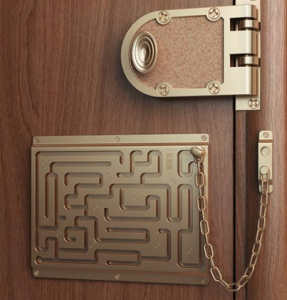 If we were exploring the corridors in an unfamiliar building and our way forward was blocked by a door that looked like this … we would suspect that something of value lay beyond.
If we were exploring the corridors in an unfamiliar building and our way forward was blocked by a door that looked like this … we would suspect that something of value lay beyond.
We know there is an unknown.
The puzzle we have to solve to release the chain tells us this. This is called an “affordance” – the design of the lock tells us what we need to do.
More often what we need to know to move forward is unknown to us, and the problems we face afford us no clues as to how to solve them. Worse than that – the clues they do offer are misleading. Our intuition is tricked. We do the ‘intuitively obvious’ thing and the problem gets worse.
It is easy to lose confidence, become despondent, and even to start to believe there is no solution. We begin to believe that the problem is impossible for us to solve.
Then one day someone shows us how to solve an “impossible” problem. And with the benefit of our new perspective the solution looks simple, and how it works is now obvious. But only in retrospect.
Our unknown was known all along. But not by us. We were ignorant. We were agnostic.
And our intuitions are sometimes flaky, forgetful and fickle. They are not to be blindly trusted. And our egos are fragile too – we do not like to feel flaky, forgetful and fickle. So, we lie to ourselves and we confuse obvious-in-hindsight with obvious-in-foresight.
They are not the same.
Suppose we now want to demonstrate our new understanding to someone else – to help them solve their “impossible” problem. How do we do that?
Do we say “But it is obvious – if you cannot see it you must be blind or stupid!”
How can we say that when it was not obvious to us only a short time ago? Is our ego getting the in way again? Can our intuition or ego be trusted at all?
To help others gain insight and to help them deepen their understanding we must put ourselves back into the shoes we used to be in: and we need to look at the problem again from their perspective. With the benefit of the three views of the problem: our old one, their current one and our new one we may be able to then see where the Unknown-Known is for them – because it might be different.
Only then can we help them discover it for themselves; and then they can help others discover their Unknown-Knowns. That is know knowledge and understanding spreads.
Understanding is the bridge between Knowledge and Wisdom.
And it is a wonderful thing to see someone move from conflict, through confusion to clarity by asking them just the right question, at just the right time, in just the right way. For them.
Socrates, the Greek philosopher and teacher, knew how to do this a long time ago – which is why it is called the Socratic Method.
